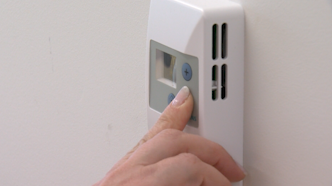Lincoln schools eye further efficiency goals after EPA recognition
With two LPS facilities getting Energy Star certification, more should follow.
LINCOLN, Neb. (KLKN) – Irving Middle School and Belmont Elementary may be the two Lincoln Public School buildings with an Energy Star certification sticker on the front door, but they couldn’t have done that without a district-wide effort.
“We are a large organization in the Lincoln community. We have a lot of facilities, we consume a lot of resources”, says Sustainability Coordinator Brittney Albin. “We want to operate efficiently and sustainably, just like any other organization.”
LPS was able to boost its efficiency quite a bit, partially due to upgrades brought about by the 2014 bond issue. A key component of that expenditure was a pivot to geothermal energy being used in the HVAC systems at Irving and Belmont.
“The initial investment is usually the higher one, but the paybacks are very quick”, says LPS Director of Operations Scott Wieskamp. “We spent a lot of time studying that system 25 years ago, and we’ve really implemented it across the district. We only have two buildings that are not geothermal at this point in time.”
That’s pretty good, considering there are around 70 buildings in the district. That also means there are plenty of opportunities to continue improving.
Irving has an Energy Star rating of 98. Belmont rates 95. That means that they’re more efficient than 98 and 95 percent of similar buildings in the country, respectively.
Wieskamp says while those are high ratings, a lot of the district isn’t too far behind. “We probably have ones that rate maybe at 80, and we’ll look at the ones that are at the bottom of that list and say, ‘Okay, what can we do to take that 80 and move it up to a 90 or 95?’.”
Given that 50 of the buildings have a rating of at least 75, that’s not an unrealistic target. Insulated buildings, LED lighting, and the rest all help accomplish that goal, but the biggest part is played by people.
“Remembering to turn off the lights and turn off equipment that isn’t being used”, suggests Albin. “How can they help us make sure that doors aren’t being left open and wasting energy that way? Just little behaviors in our schools that they can help support.”
In the bigger picture, those behaviors can be brought back home to keep things going in the right direction.



